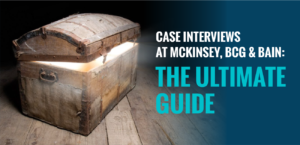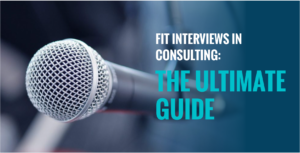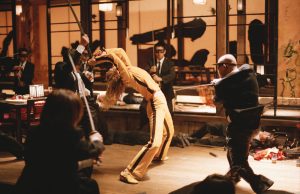A great consulting interview is one where candidates not only demonstrate that they have all of the skills needed to become a high performing consultant, but also it’s one that gets the interviewer excited about having the candidate on their team.
In this article, we outline the three key aspects of the interview and what you need to aim for in each to help you stand out.
We go into far more depth and give you the tools to develop the skills you need to stand out in our Interview Prep Course.

Build a genuine connection with the interviewer
Before we get to the mechanisms of the interview, it’s worth noting that it’s all too easy to walk into an interview, act like you’re under exam conditions, feel under pressure to perform, and completely forget that the person talking to you is also a human.
Remember to relax as much as you can and get curious about your interviewer, ask them questions to build rapport, be confident but not arrogant and share a little about yourself to build likeability.
This is an important part of the interview process and it’s often overlooked, leading to many candidates not receiving an offer, despite ticking all the boxes in the fit and case interview.
Nail the fit interview
Most candidates focus on preparing for the case portion of the interview and allow the ‘fit’ or ‘personal experience’ aspect to fall by the wayside. Given the fit interview is 50% of the assessment, if you want to land an offer you cannot afford to make this mistake!
In a full fit interview, you will be expected to give a brief introduction to yourself, share key aspects of your experience and explain the motivation behind making the decisions you’ve made so far. This will usually be around 60 seconds.
In this introduction, you have the opportunity to highlight your best and most relevant experiences, connect with your interviewer and share anything particularly memorable. However, an introduction like this is less common in interviews with McKinsey where the interviewer typically jumps straight into the meat of specific achievements.
Top consulting firms each look for similar but slightly nuanced competencies in their candidates. The fit interview questions are used to evaluate whether you have demonstrated the required skills, such as leadership, personal impact, passion and results. The interviewer my interrupt you and ask for more detail in some areas, so be prepared to go a few levels deeper into the stories you choose to share.
Remember to be concise and don’t bore your interviewer. Use engaging stories, and make sure to talk about anything that’s particularly unique or memorable. But avoid coming across boastful or arrogant.
Here is what a successful fit interview could look like:
Nail the case interview
The case interview is designed to test your problem-solving skills and simulate a real-life consulting project. This is so your interviewer can get a feel for whether you’d succeed on the job or not.
During the case interview, you’re expected to demonstrate excellence in an array of skills, such as structuring a problem, creativity, math skills and synthesis.
Many candidates make the mistake of applying a standard framework to a case question, rather than structuring the problem thoroughly. Many also fail to fully clarify the problem before structuring their solution and end up working on a slightly different problem. Don’t make these mistakes! Instead, learn how to structure any type of case, no matter how obscure, by learning structuring skills rather than frameworks. Make sure to clarify the problem up front so you don’t misinterpret the information and miss the mark.
Another key area that candidates slip up in is the math within the case. To avoid this also being your Achilles’ Heel, remember to outline your approach upfront, run and check the calculations, keep organized on the page, and look for how the answer impacts your solution to the case.
With this in mind, one of the most important ingredients to making sure you succeed in a case interview is case leadership, or in other words, driving the case forwards rather than acting as a passenger in the interview.
Here is what a successful case interview could look like:
Most candidates don’t get to this level of proficiency until they’ve done at least 25 live practice cases. Although many candidates rigorously prepare for case interviews, they do so blindly because they don’t use high-quality resources from a reputable source, they don’t develop the skills being tested well enough, and they fail to practice cases with partners who can give them quality feedback.
Don’t be one of those people! You can sign up to our Interview Prep Course here to make sure you have everything you need to fully prepare for and succeed in both the fit and case interviews at top consulting firms.






